Interview with Máire Brennan, (Clannad)
by Mairéid Sullivan
from Mairéid's book "Celtic Women in Music" (1999), published by Quarry Music Press,
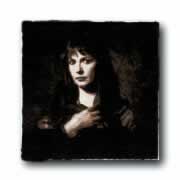
![]()
![]()

The
eldest of nine children, Máire Brennan was born Marie
Ní Bhroanain, on August 4, 1952. She has been the leader of
the band, Clannad, since they began in 1970.
In 1999, they celebrated
their twenty -fifth anniversary, and won a Grammy for best New Age
album of 1998. This group, from Gweedore in Co. Donegal, Ireland, has
successfully crossed the bridge between folk and rock. The word
Clannad means 'family' in Gaelic, and the group formed initially to
play folk festivals in Ireland. At the time the line-up consisted of
three of the Brennan children, and two of their uncles. The group's
first successes came in Germany where they toured in 1975. Clannad
initially caught the attention of the wider public in the UK when
they recorded the theme tune for television's Harry's Game in 1982.
The single reached number five in the UK charts, and received an Ivor
Novello Award. In 1984 they recorded the soundtrack to television's
Robin of Sherwood and reached the Top 50 in May the same year. The
following year the song received a British Academy Award for best
soundtrack.
Further chart success followed with the 1986 UK Top 20 hit 'In A Lifetime', on which Máire did a duet with Bono from U2. From their early days when despite establishing themselves into the rock mainstream, Clannad have always retained the Celtic quality in the music.
Máire and her husband Tim have two children, a six year old girl, Aisling (Ash-leen), and a five year old boy, Paul.
THE INTERVIEW
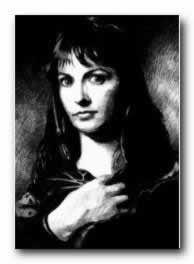 M.B.
I believe there is so much interest in Celtic culture because it is
so deep. It's quite incredible, and fascinating, that people haven't
tired of it yet.
M.B.
I believe there is so much interest in Celtic culture because it is
so deep. It's quite incredible, and fascinating, that people haven't
tired of it yet.
I think it's more than just a phase, or a fad, because of the ancient aspect attached to it; the treasures attached to it, the origins and the ancestries, and the bonding. There's a bond there that people feel, even people who have no Celtic connections to speak of. There's still a bond, because the Celts have traveled the globe.
The islands have sent a huge population out, all over the world. Ireland, itself, has a population of four million. You've got families who, up to recently, had nine and ten children. An average family is six children now. So where do they all go? The people are very much spread out.
M.S. When I came to the U.S., in 1995, I asked the Irish Cultural Center for the population statistics, and they said there are forty million people, in the US, with direct Celtic roots, and another thirty five million, on top of that, with indirect Celtic roots.
M.B. Really? That is amazing. What has really interested me, too, is the fact that ten percent of the Irish people went out, in the eighth and ninth century, throughout the world. Saint Brendan was supposed to have been in America well before any other Europeans. There are certain roots of the culture planted in places where there wouldn't appear to be any Celtic connections. Why is it that the music is still strong in other cultures and played, interactively, with their own? There isn't a country that doesn't like Irish music.
M.S. The are so many styles of Celtic music, as well as an amazing profusion of literature on Celtic history available now. For the curious, it's plain to see how uniquely diverse qualities and aspects of the culture have survived, both at home and abroad.
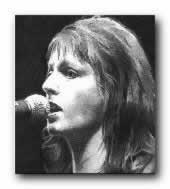 M.B.
I think it helps to understand the effect of the great number of
people who went out from Ireland, as missionaries, a long time ago,
even before the mass immigrations. They were the first to spread
Celtic Christianity. It's nearly like a tradition that Ireland has
…this migration pattern. Immigration has happened in mass,
because of the famines and the evacuations. But I really think it's
always been in the Irish blood, to be nomadic. They have planted
themselves in distant places we don't even know about, all over the
world. Years ago, they traveled by boats, not by land. They were
great seamen, and they had the Currachs, which were very strong
boats. They were able to survive for great lengths of time at sea. We
have proved that was possible, with the re-enactment of Saint
Brendan's voyage. So, I really think that's how they had the
opportunity to touch people's hearts in far off places.
M.B.
I think it helps to understand the effect of the great number of
people who went out from Ireland, as missionaries, a long time ago,
even before the mass immigrations. They were the first to spread
Celtic Christianity. It's nearly like a tradition that Ireland has
…this migration pattern. Immigration has happened in mass,
because of the famines and the evacuations. But I really think it's
always been in the Irish blood, to be nomadic. They have planted
themselves in distant places we don't even know about, all over the
world. Years ago, they traveled by boats, not by land. They were
great seamen, and they had the Currachs, which were very strong
boats. They were able to survive for great lengths of time at sea. We
have proved that was possible, with the re-enactment of Saint
Brendan's voyage. So, I really think that's how they had the
opportunity to touch people's hearts in far off places.
M.S. When you have a culture, whose people are constantly traveling, both willingly and unwillingly, 'longing' becomes a feature of their communal life. Longing for loved ones becomes a focus of the songs and the lifestyle itself. Their longing had no respite and it is still recognizable in the music.
M.B. I think that's because we have an incredible emotion attached to us, that is expressed in this yearning, this longing. The great thing about the Irish people is that we are open people. We're emotional people, and we are not afraid of our emotions. That's one of the aspects that people love about the Irish, their openness, their attitude, their approach to life. My theory is that they have gained a huge sense of hope and encouragement from the development of deep-rooted spirituality.
M.S. Tell me how you describe that spirituality?
M.B. For a long time, I was looking from the outside in, when everybody else seemed to be focusing on Celtic culture. Throughout my twenty-eight years with Clannad I had seen and felt the huge surge of interest in the Celts. Every five years or so something sparks it off, the most recent spark being Riverdance and Lord of the Dance. You've got three Riverdance and two Lord of the Dance troupes touring the world. They're packed! You can't get in! I've seen it building up: From the first time that we played in small clubs, to return concerts in 2000 seat auditoriums. I also saw that a lot of the interest was leaning towards the Irish mythology, and I love that side myself. I love the folklore stories because I was brought up with them.
But that's not all that Irish and Celtic culture is about: What our ancestors became, where they developed, is what it is also about. It's about the unique way the Celts developed in Ireland; the way they achieved a very strong culture in Ireland; the way education was an important aspect of their culture, long before anywhere else in Europe, with the unbroken tradition of their ancient schools.
All of that is important, but now, for instance, we celebrate St. Patrick's Day all over the world. The whole story about St. Patrick himself is an incredible story. Rather that remembering him with green beer, people should realize who this person really was, and what he did, almost single-handedly, for Ireland.
Patrick was kidnapped into slavery there, he got to know the culture, and then, because of that familiarity, that bond, he returned to Ireland and taught Christianity 'within' the culture. He didn't bring Christianity in, in a ritual form. Reading down through different histories, I have found that our missionaries, who went to different places around the world, in the earliest time, took the same approach. Christianity was passed on without a strict, dogmatic regime in the beginning. The hierarchy came in long afterwards and said, "This is how it should be". Celtic Christianity developed in Ireland long before the hierarchy came in, and it became really rich. When Patrick came into Ireland, slavery was practiced, so there were certain practices within the country that were not in good order. Christianity brought the prospect of goodness into the culture, into the lives of the people. It set new moral standards; it inspired a renaissance, a golden age.
Down through the years, I have often been asked, "What is it about
the Irish people, who are such a tragic race, with a history full of
sadness and tragedy, that they write so many songs, and that in all
these songs there is always an expression of hope?" It is never dark.
The reason is, their Christian belief is based upon such great
strength and such strong belief. That's why it was very important for
me to make an issue of the fact that from the time of our distant
ancestors, this is how they lived. They lived with, and they carried
with them everywhere, the great strength of a powerful belief.
Today,
people come to Ireland and they might visit the Skelligs, where the
monasteries were. They may go to see the Celtic crosses or the Book
of Kells, but they should realize that all of that history came from
Celtic Christianity and not mythology. It became an important matter,
to me, when I realized that people weren't seeing all of that as part
of the older folklore. Don't get me wrong, I love the folklore. But
it is the larger issues, for example, how Tara's Hill became a
spiritual place that I think we should be thinking about. I used to
hate history and now I find great power in it.
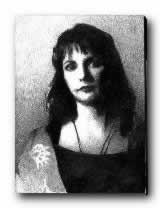
M.S. What has the power of this knowledge awakened in you?
M.B. Well, because of my growing understanding, I have become a spiritual person myself. It's really wonderful to feel the power of it. The strength I experienced while making my last album came from that, exactly. I've written words for the songs on 'Perfect Time', and I do know where they came from. I never classed myself as academically inclined, but I have found that there is so much inspiration coming into my spiritual life from gaining a new perspective on the past. There is a lot more in there to be experienced through my inner life. It's full!
We talk about Tir Na Nog but then we can talk about Saint Columba,
Saint Brigid, Saint Brendan, Saint Aiden; the stories attached to
these people are incredible. Saint Aiden went to Lisdisfarne, in the
north of England. Columba went to Iona with twelve monks, and that's
where Presbyterianism started. While the dark ages were happening
right across Europe, including most of England, Ireland became 'the
land of saints and scholars'. The Irish enjoyed a golden age.
The miracles around Saint Columba are amazing. He is from Donegal; he was born into a high-middle class family. He was like a Francis of Assisi in Donegal. He loved the earth. He loved the woods. That's why he changed his name to Colmcille. Colum means 'dove' and 'cille' means 'wood'. Derry was once known as Daire Colmcille, meaning 'Derry, the dove of the woods'. There are beautiful, inspirational stories about his life. That treasure is all around us and we seem to glide over certain aspects of it and look at others. I see real strength in the history of the lives of these saints. I'm looking back to about five hundred, seven hundred years, and a thousand years ago, and we're still talking about Christian Ireland. In Irish music, we don't play anything older than 500 year. We are really talking about the hearts of the people, of that time, and their very strong spirituality. They loved the earth; they worshiped God through acknowledging the beauty of the earth.
M.S. Would you say that their highest expression was joy?
M.B. Absolutely! They were very happy and content people. That's how they lived and survived. They were able to see reason in even the saddest things.
M.S. They weren't focused so much on external issues, because they were still living in relative peace, politically. They had time to develop a profound understanding of the new meaning that Christianity brought to their lives.
M.B. It's wonderful to take inspiration from those wonderful stories of the lives of the saints. I think Brigid is supposed to have been the daughter of a Chief Druid, who had no problem with her becoming a Christian. Christianity was a new phenomenon. It had just been brought in. It offered something really good, which they recognized.
Now, it is amazing that this country, which has such a magnificently rich Christian heritage, should be split within the Christian community, the Catholics, and the Protestants.
M.S. At least we can see what went wrong and there is hope that we can turn it around now.
M.B. I know. But we must first see that the problems arose when people took what Christianity was about and made it they're own. In other words, they became possessive with its teachings. If you stop respecting the way others worship, then the hierarchy takes it over, and makes it a 'business'. That is very, very unfortunate.
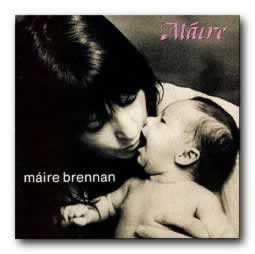 I
have been playing in Northern Ireland quite a bit, at various events,
and I have found that there are a great many projects, within the
communities, which set out to help people reconcile their
differences, and forget about the political side of it. It's the
Christianity side of it that people need to focus on because that is
where the heart is. It has given me great strength to have come to
realize that this is what the future will be about. The people
themselves are going to be reconciled because they will want to focus
on binding their children together.
I
have been playing in Northern Ireland quite a bit, at various events,
and I have found that there are a great many projects, within the
communities, which set out to help people reconcile their
differences, and forget about the political side of it. It's the
Christianity side of it that people need to focus on because that is
where the heart is. It has given me great strength to have come to
realize that this is what the future will be about. The people
themselves are going to be reconciled because they will want to focus
on binding their children together.
M.S. The people are going to take matters into their own hands to heal the community.
M.B. Obviously we need our government bodies, but when it becomes a religious based political war, that's when it is very sad to see division amongst people.
M.S. You project a wonderful harmony and a great sense of hope from the perspective you have found on these serious matters.
M.B. It has completely changed my life. I am a Christian. I believe in the basic Christian themes that we have been given about loving your neighbor and honoring God and praying. That's what I do. First of all, the simplicity I have found in it is amazing, because we have made life seem so complicated. Everybody is out there searching. I have found it in Christianity but that is where my ancestors found it as well. They found strength in knowing that they weren't by themselves. They found a great sense of hope in Christian beliefs.
M.S. Where do you go to tune in, to pray, to find your inspiration? Do you have a special place that you like to go to?
M.B. It can be anywhere, but I have to say Donegal has a lot to do with that. I love just being able to walk anywhere in Donegal. There are places there that are just so peaceful.
M.S. Do you have certain prayers that you like to say?
M.B. Prayer is just talking to God. I have used samples of Saint Patrick's Breast Plate, in one of my songs, which is 'Christ with me, Christ on my right, Christ on my left, Christ above me, Christ below me." I meditate on the knowing that God is with me.
M.S. This is how you reach your bliss, how you reach your maximum joy?
M.B. Yes, it is. Very, very much so. I feel blessed and very lucky. I don't like to evangelize about my experience too much. Recording "Perfect Time" has made it easier for people to ask me about my insights. I hope people can sense this through my music
M.S. How does all of this re-interpret what you have done musically, to date? You must look back at the magic of your life and have a new insight into your purpose
M.B. Yes, I do. I really find it difficult to believe people when they say they aren't looking for something more meaningful in their lives. Material wealth doesn't make you happy -- bottom line. You can pretend it makes you happy.
There are a lot of young people, inexperienced with life, who are scared about going into the millennium, because they just don't know what's there. Think, if you were young again and starting off in life, it could be overwhelming. They must ask, "What's out there?" because they don't know yet. I went through a bad time when I was younger, I was rocking' along and I came to a stop and asked myself, "What's going on? I'm not happy." I wanted to search. I was brought up as a Catholic so I started to pray for guidance and then I met my husband, Tim, who is a Christian. Between us, we've learnt an awful lot from our differences, because he was brought up Protestant in England. What we learnt was a very important aspect of what we're about now. The pieces fit together like a jigsaw. We realize that there was something in our history that was greater that we ever realized. Even our writers, Joyce, Yeats, Shaw, debated from within their spirituality. You can see it in their writing. It made them better writers. We are close to losing that, we seem to think that it's cooler not to be thinking of wanting something more in our lives; a spiritual being or a spiritual focus.
M.S. Over the last few years, I've noticed that it is much easier to talk about personal spiritual life without it becoming political, or controversial in some way.
M.B. That's what I love to see.
M.S. There's a greater prospect of our not competing with each other when we are more spiritually attuned.
M.B. Why should we be ashamed to talk about our spirituality? Those people who left on those boats long ago had such a powerful welling up of the spiritual inspiration in their breasts. Their vision gave them enough courage and inspiration to carry them on, to the ends of the earth. To be able to express this feeling musically is tremendous.
DISCOGRAPHY
Heart Strings 2008
Signature 2006
An Irish Christmas 2005
Two Horizons 2003
Whisper to the Wild Water 1999
Perfect Time 1999
Misty Eyed Adventures 1994
Máire
With Clannad
Landmarks 1998
An Diolaim 1998
Celtic Collections 1997
Rogha: The Best Of 1982-89 1997
Rogha-Best Of 1982-89 1997
Lore 1996
Clannad Themes 1995
Banba 1993
Anam 1990
Pastpresent 1989
Sirius 1987
Macalla 1985
Legend 1984
Magical Ring 1982
Fuaim 1982
Crann Ull 1980
In Concert
Dulaman
Clannad 2
Website: http://www.wordrecords.com/maire_brennan/maire_audio.html